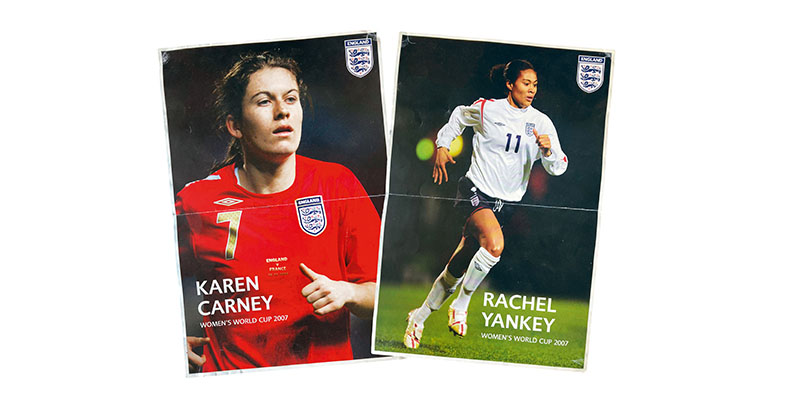
A pair of posters that adorned a bedroom wall in 2007 tell a story of how far the women’s game has come
July 5 ~ “Cry in the beginning so you can smile at the end.” You might have seen Marta, captain of Brazil, give this speech following the Seleção’s exit from the World Cup in the summer of 2019. The 34-year-old broke the record for the most goals, 17, scored at a World Cup by anyone ever in what was likely to be her last major tournament.
After France knocked her side out of the competition, Marta used her post-match interview to inspire the next generation of players. Staring down the camera through a blur of lipstick and tears, she asked young players to commit, to feel desire, to be ready, as women’s football needed them to survive. I felt moved watching it, but it saddened me too. This was a swansong for a hero who had yet to be accorded their due recognition.
Marta’s rise began three World Cups earlier in 2007 when the 21-year-old won the Golden Boot in Beijing. At the time, I was a ten-year-old footballer who needed her story but never heard it.
I didn’t watch the tournament – I’m not sure that you could – but was made aware of the event by a gift handed out in a post-match huddle by my Cottenham Colts Under-10s coach, Charles, earlier that year.
A pile of posters bearing faces of the women due to represent England were placed at our feet and we were invited to pick two each. I made a beeline for Rachel Yankey – I’d watched her play for Arsenal in the FA Cup final earlier that year – and selected Karen Carney for no reason other than that, like me, she wore the No 7 jersey.
It was a strange introduction to would-be idols that we could never really access – their faces weren’t on TV or in newspapers, while the pages of Match! were filled with the likes of Joe Cole and Fernando Torres.
Though I didn’t really know who they were, I made space for Carney and Yankey on my overcrowded bedroom wall and these strangers became silent witnesses to the unboxing and outgrowing of countless pairs of football boots, watching on as I failed to replace my slowly souring shinpads with as much diligence.
But my posters couldn’t single-handedly shift my younger self’s perception of the women’s national team or her vision for her own footballing future, because heroes need to be more than faces on paper; we have to have the stories that go with them.
Fortunately, things have changed since then. In 2019, Marta’s interview went viral on Twitter, a platform that was only in its infancy when her exploits deserved to make headlines in 2007. Today, social media is growing the sport by celebrating Women’s Super League stars and the Lionesses, enabling youngsters to admire them and aspire to follow in their footsteps.
But the enhanced exposure is a double-edged sword. Last season Carney, now graduated to pundit, suggested that Marcelo Bielsa’s team had only been promoted to the Premier League with the help of the Covid hiatus and was promptly subjected to a barrage of Twitter abuse, much of it misogynistic. To see this half-hero of my childhood, a former England player worthy of fans’ respect, attacked by the community who shared my love of Leeds broke my heart.
In that moment I felt the urge to thank Carney, for doing everything Marta asked. When hardly anyone was watching they played because they loved it, seizing their opportunity – which so many, to this day, are intent on denying them – for a paltry salary and scant recognition. Years later, I took the posters down but, while Doctor Who insignia and All Time Low pin-ups were turfed into the recycling bin, I kept hold of Carney and Yankey because, although I never saw them wear the Three Lions, I knew somehow that these players were important. Though it sometimes feels as though the progress of women in football is one step forward, two steps back, Lucy Bronze is now someone girls strive to be, much more than an anonymous face Blu Tacked to a bedroom wall.
I can’t wait for this summer’s home Euros – to discover which players will be heroes of the 2022 tournament and witness young footballers be inspired to become the stars of the next. Back in 2007, picking out Carney and Yankey from a sea of strangers made me feel briefly as though I was part of something. I feel joy knowing that girls playing now are part of something much bigger. Flora Snelson
This article first appeared in WSC 422, July 2022. Subscribers get free access to the complete WSC digital archive – you can find out more here.
Want to see your writing published in WSC? Take a look at our pitching guide and get in touch
